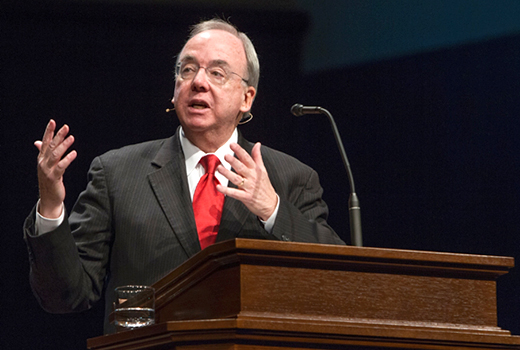Americans are more concerned with their choice of toothpaste than with their denominational identity, David Dockery said in calling for unity across denominational lines during the 2014 Day-Higginbotham lectures at Southwestern Baptist Theological Seminary in Fort Worth, Texas.
Dockery, president-elect of Trinity Evangelical Divinity School in Deerfield, Ill., based his statement on the results of a 2012 Gallup poll that found only 16 percent of Christians said their denominational identity was important to them. In the same poll, Dockery said, 21 percent of the general population said it mattered to them what kind of toothpaste they chose.
“So denominational identity is not nearly as important in the lives of some as it is for me and for you,” Dockery said during the March 6-7 lectures. “It is possible to hold hands with brothers and sisters who disagree on secondary matters and work together toward a common good to extend the work of the Gospel around the world and advance the kingdom of God.”
Stressing overall unity among Christians, Dockery still held the importance of denominations and evangelical identity. He examined denominational development and decline, evangelical identity and the future of theological education in the 21st century.
“Why look at denominations?” asked Dockery, who is completing an 18-year tenure as president of Union University in Jackson, Tenn.
“Because historically, denominations have been the instruments used of God to help men and women who think in organizational terms to provide structure for carrying forth three major things:” Dockery said, “one, the supporting and starting of churches; two, maintaining shared beliefs and practices, and three, the enabling of shared work of evangelism, missions, education and benevolence.”
Dockery began his series of lectures by summarizing the long history of denominations, beginning with the three broad traditions that have shaped the understanding of the Christian faith throughout history — Roman Catholicism, Eastern Orthodoxy and Protestantism. He discussed how various denominations grew from these three branches over the years, leading to thousands of denominations and their variations.
Dockery then looked at evangelicalism, which he said is distinct from a denomination.
“Evangelicalism is a cross-denominational movement,” he said. ” people who are heirs of the Reformation, influenced by Puritanism and pietism, shaped by the 18th century revivals and 19th century mission movements. Largely it’s a renewal movement that countered liberalism, rigid fundamentalism and dead orthodoxy.”
Regarding evangelical identity, Dockery said it is “grounded in a commitment to the truthfulness and authority of the Bible, to the uniqueness of the Gospel, to the necessity of conversion and to the need then, for taking this Gospel to the ends of the earth in forms of service and mission.”
Dockery ended his series by discussing the future of theological education. He encouraged renewed emphasis on a number of topics, including biblical, theological and ministry formation (including the use of mentoring models rather than just lecturing hundreds of students at a time); helping students think about church health, renewal and church planting; careful biblical interpretation and theological reflection, and a global vision that includes cross-cultural and intercultural conversations that are contextual and convictional.
The Day-Higginbotham Lectures were established in 1965 in honor of Paul Higginbotham, a Fort Worth businessman, and Mr. and Mrs. Riley Day, parents of Mrs. Edwin Reardon III, who established the lecture fund. The lectures are presented annually by a scholar in a theologically related discipline or current interest.
— Alex Sibley is a news writer for Southwestern Baptist Theological Seminary in Fort Worth, Texas.
